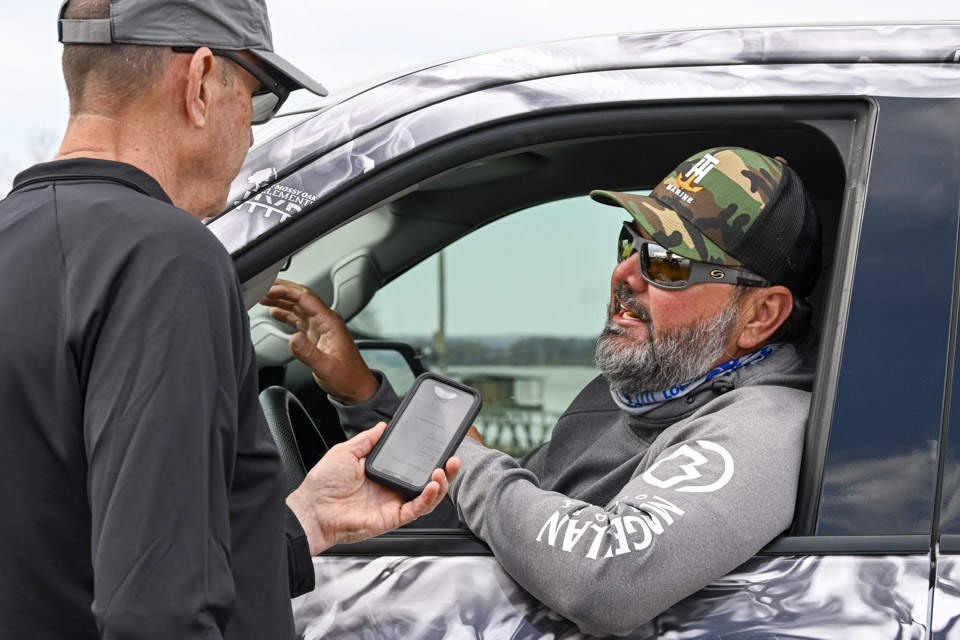
When 50 year-old Greg Hackney launches his boat tomorrow, it’ll mark his 225th Bassmaster event and 18th Bassmaster Classic. He’s won six B.A.S.S. events, including three Elite Series tournaments, an Angler of the Year trophy and the 2009 Forrest Wood Cup. The accolodes are meaningful and rewarding, but it’s the hundreds of thousands of road miles that mark his tenure, the dues paid for a career at this level. He carries the receipts in his bones.
“It never hit me until today,” he said. “I’ve fished so many Classics, but I’ve gotten to the point where I’ve competed against two totally different groups of guys. I’ve succeeded with both groups. It’s a blessing for me to be here, a feather in my cap to be at a bunch of them. It’s hard to find anyone who’s been as consistent as me, day in, day out.”
That consistency has clearly paid the bills, but he still lacks a Classic trophy, and the familiarity with the process guarantees him nothing beyond another bite at the apple. Meanwhile, Elite rookie and Classic first-timer Kyle Patrick, who referred to Hackney as a role model, has the same chances of winning. So does first year Tyler Williams, who had not yet turned 2 when Hack attacked his first Classic in New Orleans.
Fishing is a meritocracy insofar as the standings ultimately come down to what the anglers put on the scales, but there’s seemingly no room for notions of fairness or karma. Paying dues – defined loosely – helps anglers achieve, but there’s no formula, no “10,000 hour rule” allegedly guaranteeing success. Both Patrick and Williams earned their Classic berths through Opens wins. They both have Century Belts. Right now, no matter how easy or how hard it’s been to get there, everyone’s tied on the leaderboard.
Carl Jocumsen, fishing his second Classic, has more domestic miles on his Bassmaster odometer than either Patrick or Williams, but far fewer than Hackney. He was in the Elite Series, out of the Elite Series, and then back again tenuously before finding a groove. He recognizes that adversity is what you make of it.
“That’s what life is about,” he said. “The only way to be truly grateful and humble and restful is to pay your dues in full. I feel I’ve done that tenfold, but eventually you have to realize that some people get red lights when others get green lights. That’s what made (my win at) Teniller so special. The meaning comes from the journey.”
At some point this week, each contender for the throne – regardless of his age or level of experience – will have to overcome some obstacle. It might be a speed bump or it might be a brick wall in the way. Winning the Classic trophy, and earning Hackney-grade longevity, comes down to how they deal with those moments, both on individual occasions and over the long haul.
“You don’t get to choose when you have adversity,” Jocumsen said. “I’m thankful to have had some early. The struggles are there for everyone. Success comes from how you deal with them.”
Today Hackney admitted that his greatest blockage to past Classic success may have been in his own brain. In his past 17 attempts, he’s finished 10th twice and 5th once, but otherwise below that range. Notably, two of his better finishes – 13th and 10th – came here at Grand Lake.
“Early on, I didn’t enjoy the Classic,” he said. “I didn’t embrace that it was for me. I probably put too much pressure on myself. Today I still do everything I think it’ll take to win, but I know that it doesn’t make me a lesser person if I never win one.”
The greater lesson that he’s learned is that what initially seems like a bump in the road sometimes turns into a springboard to prosperity. He’d left the Elite Series after the 2018 season and found out that the grass is not always greener on the other side of the fence. Then COVID hit. “I thought it would wipe out the country,” he said. “There was so much doom and gloom but I got to camp with my family for two months. It made more people go fishing. The State of Louisiana sold more fishing licenses than ever in history.”
Most importantly, though, out of the disaster came his return to BASS.
When the pandemic jumbled up tournament schedules, it enabled him to fish a Central Open on the Arkansas River that previously would’ve had a conflict, and he thereby requalified for the Elites. That’s what put him here today, just about 95 miles from where that Central Open occurred. Just as you can’t predict when your adversity will come, the universe has a subtle way of providing a nudge just when it’s needed. That nudge wasn’t just about a route back to the tour, but also about realizing his values.
“I still enjoy bass fishing,” he said. “It’s what I love to do.” And that is what puts him in the same boat with the gunners who’ve joined the tour seemingly fresh out of diapers. The wins matter, but it’s the journey that defines success as much as the destination.
“It might be better if I never won it,” Hackney said. “I could be like the dog chasing the car. It might be best that I never catch it.”
Nevertheless, were he to win this week, he promised a celebration worth waiting for.
“It would be fun for a while,” he said. “The party will probably last a couple of days.”
After nearly three decades in the trenches, that only seems appropriate, and if it doesn’t happen, you can expect him to trust the process and return for another attempt next time around.





